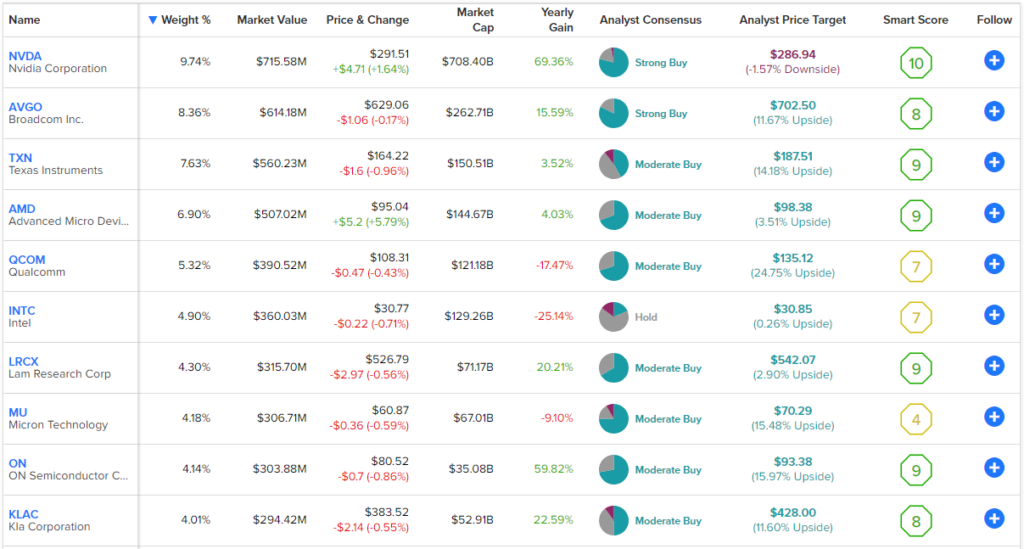Semiconductor stocks were taken to the cleaners in 2022, as concerns about oversupply hit the industry at the same time when rising interest rates hit tech and growth stocks particularly hard. The iShares Semiconductor ETF (NASDAQ:SOXX) fell by 35.1% last year. However, the industry is bouncing back in 2023, and SOXX is back with a vengeance, to the tune of a 20.7% rebound year-to-date. Meanwhile, SOXX continues to look compelling over the long term, even after this run-up, which is why investors should consider putting this ETF on their watch lists.
Elevate Your Investing Strategy:
- Take advantage of TipRanks Premium at 50% off! Unlock powerful investing tools, advanced data, and expert analyst insights to help you invest with confidence.
What is SOXX ETF?
SOXX is an ETF from BlackRock’s (NYSE:BLK) iShares that invests in “an index composed of U.S.-listed equities in the semiconductor sector,” according to iShares. It has over $7 billion of assets under management and a reasonable expense ratio of 0.35%. SOXX ETF also pays a dividend, but with a yield of 1.1%, this is more of just an added bonus rather than a key reason to invest in this ETF.
Semiconductor Stocks are Still Attractive for the Long Term
While the price of SOXX and semiconductor stocks will fluctuate over the short term based on supply and demand for semiconductors and on the earnings results of individual companies, over the long term, the semiconductor space is still attractive, with powerful secular growth drivers behind it. Intel (NYSE:INTC) forecasts that the semiconductor market will grow to $1 trillion annually by the end of this decade, up from $570 billion in 2022.
Semiconductors are going into more products than ever before, from smartphones to cars and refrigerators, as more devices become connected. Meanwhile, the latest technological advances like self-driving cars, machine learning, and artificial intelligence (AI) are driving the need for more chips (and increasingly advanced ones).
Nvidia (NASDAQ:NVDA) is building its own large language models to train AI chatbots and partnering with Microsoft (NASDAQ:MSFT) to build a cloud supercomputer to facilitate AI workloads. Gamers and Bitcoin (BTC-USD) miners alike both drive demand for graphics processing units (GPUs) from the likes of Nvidia and Advanced Micro Devices (NASDAQ:AMD).
SOXX’s Holdings
Now that we’ve given an overview of the long-term outlook for the semiconductor industry, let’s take a closer look at the SOXX ETF itself.
To be blunt, SOXX is not particularly diversified. It only holds 31 stocks, and its top 10 holdings account for nearly 60% of the fund. Now, if you’re bullish on semiconductors and making a long-term bet on them, this certainly isn’t a bad thing, as it gives you plenty of undiluted exposure to semiconductors.
However, one thing to note is that the top holding, Nvidia, makes up nearly 10% of assets. Again, this isn’t necessarily a negative, but investors should be aware that they are going to have a lot of exposure to Nvidia, both to the upside and downside. If Nvidia reports great earnings or unveils a new way its chips are being used to advance AI technology, SOXX would likely do well. On the other hand, if Nvidia releases a bad earnings report, SOXX would likely suffer.
That’s just the nature of the beast when investing in an ETF like this, as Nvidia is the world’s largest chip company (by market cap) and the sixth-largest company overall, with a massive market cap of over $700 billion.
Additionally, second-largest holding Broadcom (NASDAQ:AVGO) and third-placed Texas Instruments (NASDAQ:TXN) also account for large portions of the fund. Further, Advanced Micro Devices and Qualcomm (NASDAQ:QCOM) each have weightings of over 5%. Below, you’ll find a snapshot of SOXX’s top holdings.

As you can see, what SOXX lacks in diversification, it makes up for in supercharged Smart Scores. The Smart Score is TipRanks’ proprietary quantitative stock scoring system that evaluates stocks on eight different market factors. The result is data-driven and does not require any human intervention. A Smart Score of 8 out of 10 or above is the equivalent of an Outperform rating, and as you can see above, 7 of SOXX’s top 10 holdings feature scores of 8 or above, while Nvidia boasts a ‘Perfect 10’ rating. Other positions outside the top 10, such as ASML Holding N.V. (NASDAQ:ASML) and Lattice Semiconductor (NASDAQ:LSCC), join Nvidia with Perfect 10 Smart Scores.
As stated above, it’s not always a bad thing to feature a large concentration in a handful of top few holdings, as these are some high-quality names with laudable Smart Scores. SOXX itself has an ETF Smart Score of 8 out of 10.

Is SOXX Stock a Buy, According to Analysts?
While SOXX stock boasts some strong Smart Scores, sell-side analysts are also fairly bullish on it, with a Moderate Buy consensus rating from analysts. The average SOXX stock price target of $489.60 represents upside potential of 17.5% from its current price.
Of the 450 analyst ratings on SOXX, 65.6% are Buys, 30.2% are Holds, and 4.2% are Sells.

Cheaper Than You Might Expect
SOXX is also cheaper than one might expect, especially for a portfolio of companies developing the cutting-edge products and technologies that much of the modern world and global economy rely upon.
SOXX’s holdings have an average price-to-earnings ratio of 19.35. While this isn’t so cheap that value investors are going to be pounding the table for it, it’s still a discount to the broader market — the S&P 500 (SPX) currently trades at an average price-to-earnings multiple of 23.9. Given the importance of these companies, the long-term demand for their products, and the advances they continually make, I find this discount (albeit a slight one) surprising, and it adds to SOXX’s investment appeal.
Some of the individual names within SOXX’s top holdings trade for even more attractive valuations, such as Broadcom at 15.2 times earnings and Lam Research (NASDAQ:LRCX) at 16 times earnings. The valuations of many of these semiconductor names are cheaper than those of many consumer staple companies.
While many top consumer staples giants have been great stocks and feature stable businesses, they don’t offer the same long-term growth potential as you’ll find in the semiconductor space. John Mowrey, the CIO of NFJ Investment Group, has highlighted this gap in valuations, comparing top semiconductor names like these to Hershey (NYSE:HSY), which is a great company, but trades at a much steeper 28.9 times earnings. In Mowray’s words, “If you’re going to choose between chocolate chips and semiconductor chips, we prefer the semiconductor chips.”
Conclusion
SOXX is not very diversified, but it does give investors concentrated exposure to the continued long-term growth of the semiconductor industry, which is a compelling long-term story.
SOXX’s portfolio features a bevy of high-quality semiconductor names with strong Smart Scores, and analysts also view SOXX favorably. SOXX features a reasonable expense ratio of 0.3% and looks like a promising long-term holding based on the secular tailwinds the semiconductor industry should enjoy well into the future.
















